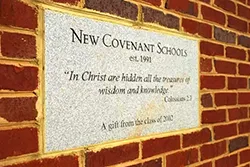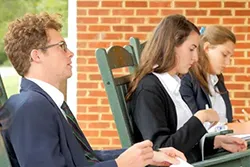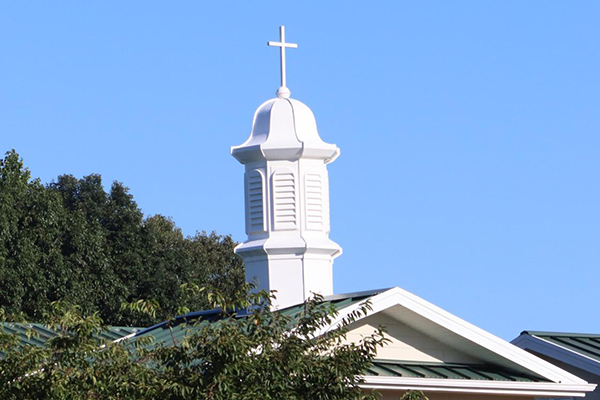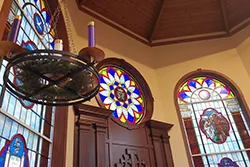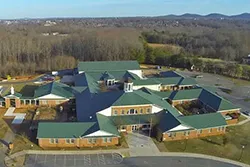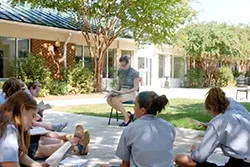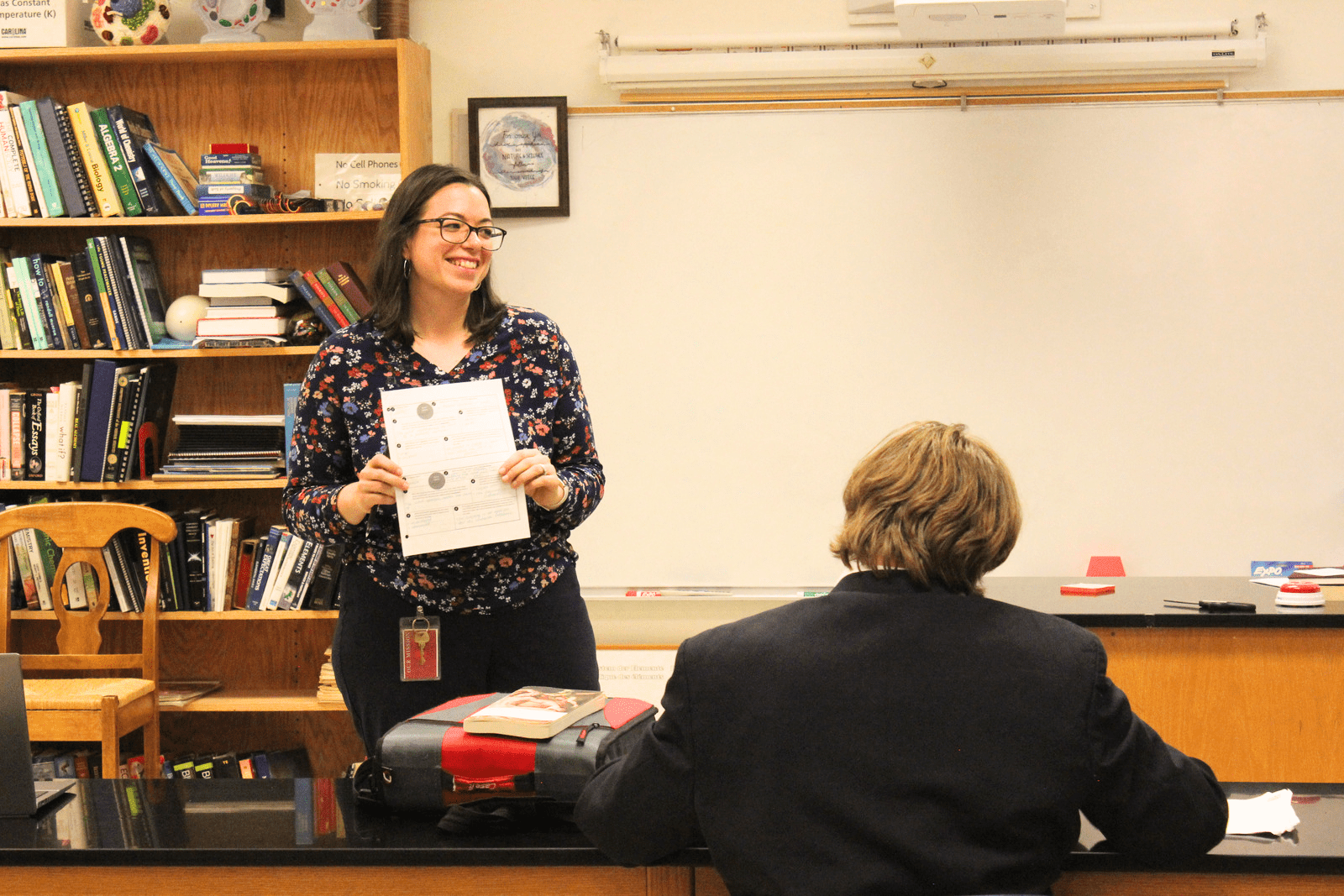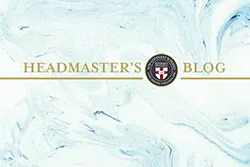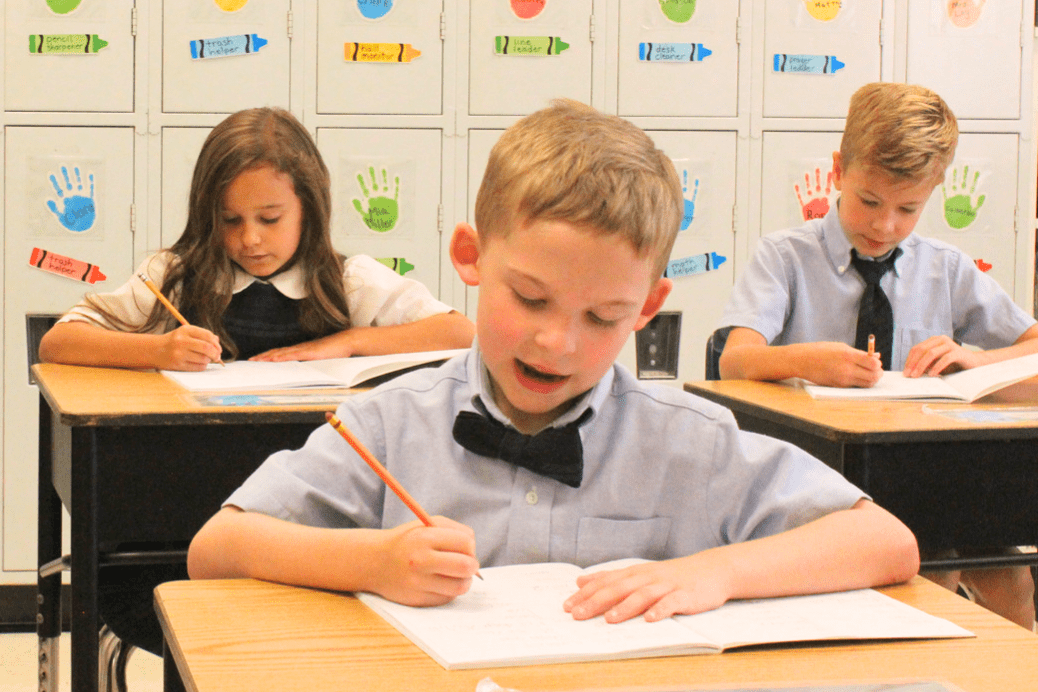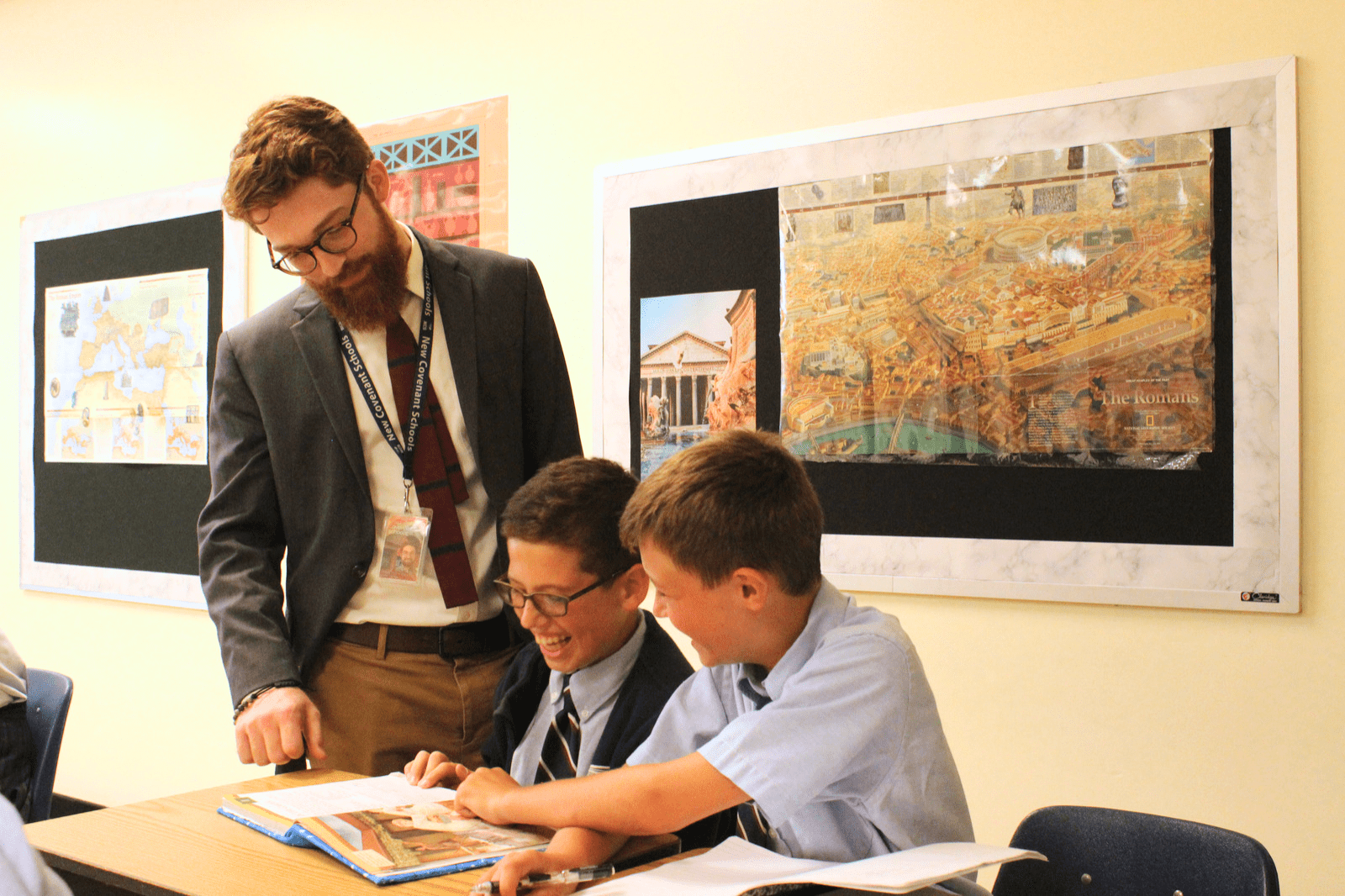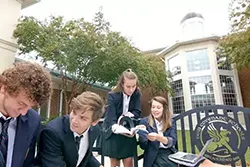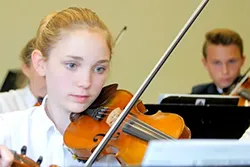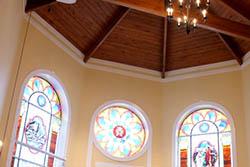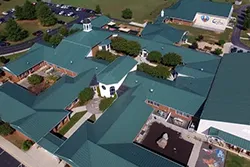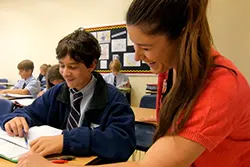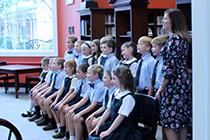School of Dialectic (5th-8th)
Your child becomes an independent learner.
Grades 5 through 8
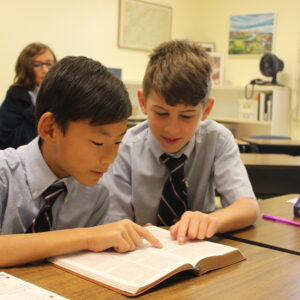
The crucial task for a middle school student is to become an independent learner. As high school approaches, students need the well-worn paths of study habits established a young age. MS students require more autonomy; at the same time they need routine and accountability to develop effective habits of study.
One way we do this is by providing direct instruction in the use of assignment books and regular meetings in advisory where instructors check students’ consistency in recording and turning in assignments or correcting returned papers.
We divide middle school into two levels, lower (5-6) and upper (7-8). Our younger students are given intentional support as they adjust to the changes of the School of Dialectic. Likewise, we prepare and expect our upper middle school students to develop leadership roles in many forums including Middle School Council and other opportunities.
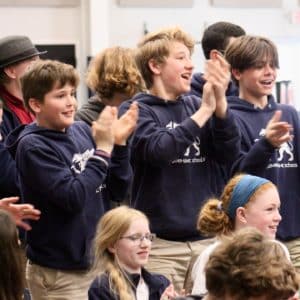 New Covenant teaches students not just what to know, but how to think. The classical curriculum explores three essential modes of learning: grammar, dialectic and rhetoric. We use the term “dialectic” to refer to those students who are developing independent study skill, and the ability to test information. Dialectic literally means to speak (or think) through, an essential skill for a student moving out of a grammar school experience, where he has learned the power of memorization. Learning by heart continues, of course, but the school of dialectic places increasing emphasis upon “Why?” and our teaching methods clearly reflect this.
New Covenant teaches students not just what to know, but how to think. The classical curriculum explores three essential modes of learning: grammar, dialectic and rhetoric. We use the term “dialectic” to refer to those students who are developing independent study skill, and the ability to test information. Dialectic literally means to speak (or think) through, an essential skill for a student moving out of a grammar school experience, where he has learned the power of memorization. Learning by heart continues, of course, but the school of dialectic places increasing emphasis upon “Why?” and our teaching methods clearly reflect this.
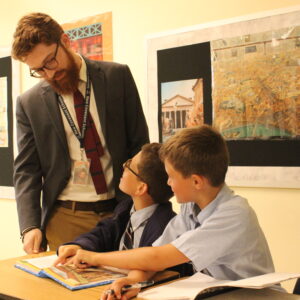 New Covenant’s middle school, or dialectic, is distinctive in several ways. Latin studies deepen as we begin to teach our students to think independently. At this level English and Latin are increasingly taught side by side so that students begin to understand how language actually works. Classes are often conducted in the Socratic method or with debate so students hone their natural love of argumentation and put it to good use. Finally, our students will be introduced to logic which helps them understand the structure of thought and how arguments can be formed validly and coherently.
New Covenant’s middle school, or dialectic, is distinctive in several ways. Latin studies deepen as we begin to teach our students to think independently. At this level English and Latin are increasingly taught side by side so that students begin to understand how language actually works. Classes are often conducted in the Socratic method or with debate so students hone their natural love of argumentation and put it to good use. Finally, our students will be introduced to logic which helps them understand the structure of thought and how arguments can be formed validly and coherently.
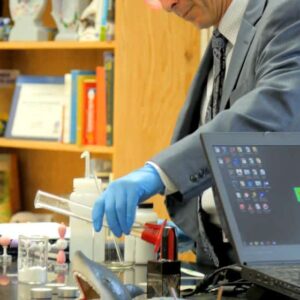 Science in the Middle School begins with a focus on observation of the created universe, a critical tool for scientists. Students learn to examine sources in nature as well as in print and to record and sometimes sketch what they have learned. In addition to natural history, life science, physical science and earth science topics are studied. These courses are supplemented with exploratory classes in birding, robot design, astronomy, neuroscience, and human anatomy.
Science in the Middle School begins with a focus on observation of the created universe, a critical tool for scientists. Students learn to examine sources in nature as well as in print and to record and sometimes sketch what they have learned. In addition to natural history, life science, physical science and earth science topics are studied. These courses are supplemented with exploratory classes in birding, robot design, astronomy, neuroscience, and human anatomy.
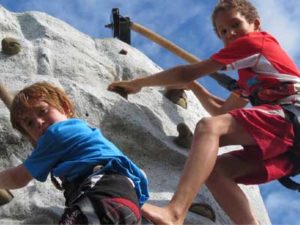
Each year the middle school takes time for fun and focus on character during the Middle School Retreat at Watermarks Camp in Scottsville, VA. This two-day event gives students opportunities to challenge themselves on high and low ropes courses, an archery range, a zip line, and more. We have the relaxed time to deepen relationships with fellow students and teachers outside the classroom. Time is also set aside for learning habits of worship and singing, and we hear from spiritual leaders about the practical ways our faith expresses itself in daily life at school. For years, this tradition has enriched our Christian life and helped us learn to live together at school with grace and growing wisdom.
Middle school is a time of great development physically, emotionally and spiritually. Students at this age navigate a range of complex issues and they need parents and teachers to engage them with wisdom. In addition to the endless distraction of social media, students at this age work hard to rank themselves in unhealthy ways. We teach into this intentionally. Read more here.
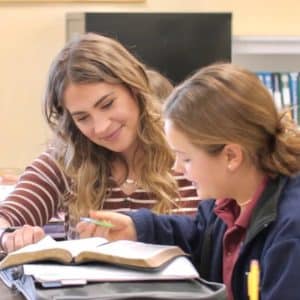 Part of becoming an independent learner is figuring out how to be organized, how to anticipate deadlines, and how to pace projects. Sometimes just keeping up with middle school life and relationships is hard enough!
Part of becoming an independent learner is figuring out how to be organized, how to anticipate deadlines, and how to pace projects. Sometimes just keeping up with middle school life and relationships is hard enough!
Middle school students meet in groups with an advisor several times a week, and give time and thought to both academic skills and social relationships. Students come to know and address their own strengths and weakness with greater clarity, and have opportunities to build strong relationships with teachers and peers through service projects and recreation.
We gain crucial feedback from faculty members who serve as advisors. Through them we learn of students’ struggles, changing class dynamics and successes, and we are better able to teach into their lives both in the classroom and in other places, particularly chapel.
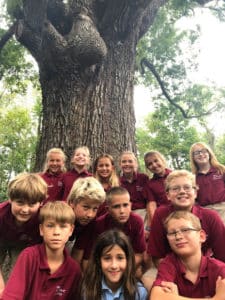 Each fall eighth graders learn leadership skills through an exploratory class, and then put them into practice through the Eighth Grade Council and the projects it coordinates. The council is elected by peers from grades 7 and 8, and they plan and execute service projects, such as Parents’ Night Out, and social events, such as the end of year party for Middle School. They manage budgets, work with administration, and lead other students to support a positive culture in Middle School.
Each fall eighth graders learn leadership skills through an exploratory class, and then put them into practice through the Eighth Grade Council and the projects it coordinates. The council is elected by peers from grades 7 and 8, and they plan and execute service projects, such as Parents’ Night Out, and social events, such as the end of year party for Middle School. They manage budgets, work with administration, and lead other students to support a positive culture in Middle School.
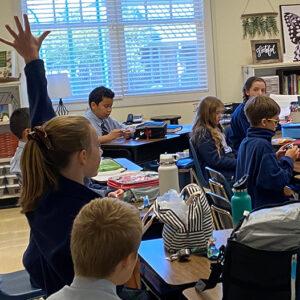
The Middle School for Dialectic seeks to promote independent learners by providing instruction and support for students who are developing study habits. Parents of middle school students routinely sense that their children are less engaged with them at home, and some disciplines, such as Latin, are far beyond a parent’s ability. As students advance in middle school, New Covenant provides support through advisory, while at the same time providing instruction through multiple teachers and limited class changes. The chart below provides an overview of New Covenant’s Middle School program.


